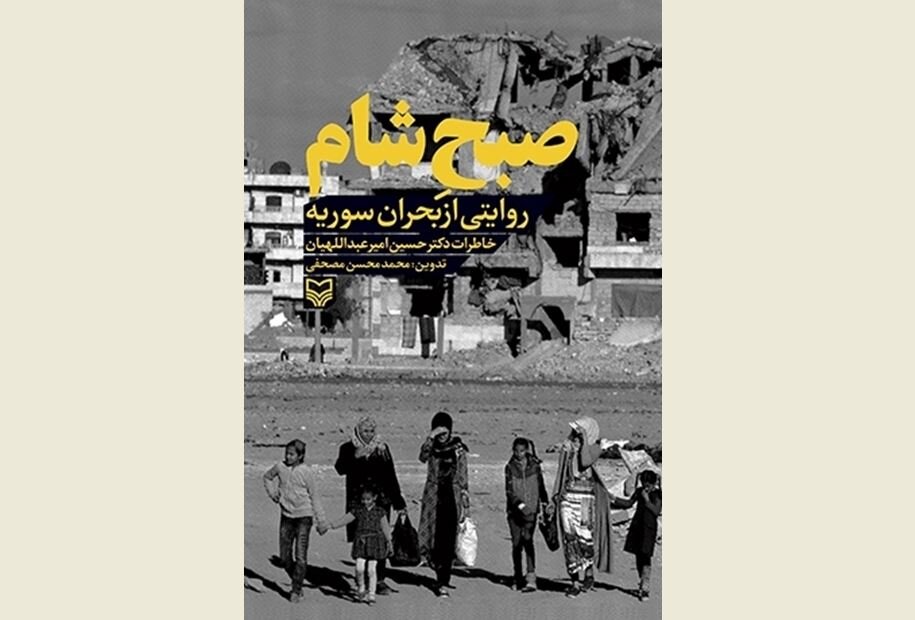Why should we read “Damascus Morning”?

Books have different readers who choose them based on their interests and beliefs. One of the most important types of books that are also considered significant documents is diaries. Books that are about important historical events and in many cases are explanations about an important topic or answers to future questions. Today, we will review a politician’s diary in Iran to see what we can get from every book about events or characters. Besides a brief introduction to the book, we will also discuss its importance which is also quoted by well-known faces in oral history.
What kind of book do we want to go through?
“Damascus Morning” by Muhammad Hasan Moshafi is a story about the Syrian crisis that has been published from Dr. Hussein Amir Abdullahian’s memories by Soore Mehr publication. The history of diplomatic relations between Tehran and Damascus dates back to the 1320s, and from those days until now, you can perfectly see that the relationship between Iran and Syria has never been based on hostility.
In "Damascus Morning" which is extracted from the memoirs of Dr. Hossein Amir-Abdollahian, the current Minister of Foreign Affairs of Iran, the Syrian crisis story is presented in three parts.
In the first part, the awakening of the Islamic and Arab world and the conflicts that took place, abusing fro, creating quarrel between Shia and Sunni, US economic incentives for military intervention, and its goals of promoting democracy in the Arab world, the difference between protests in Syria and other Arab countries, political efforts made between Tehran and Damascus, Iran's four-point plan, heavy mental pressures on Damascus, the interests of countries such as Saudi Arabia, Qatar, and Turkey from the Syrian crisis, Russia and China's positions and approaches from the Syrian crisis, Iran's humanitarian assistance, as well as social and political advisory aid, categorization different terrorist groups, the necessity of the defenders of shrine's action and a summary about the Syria situation after the crises has been examined.
In the second part, we will read about diplomatic efforts and trips made in connection with the developments in the region, and in the third part of this book, the vital role of Sardar Soleimani in controlling the Syrian crisis and ensuring the security of Iran and other countries in the region has been described.
What is significant about this book?
The tradition of keeping diaries among diplomats is very vital for the whole scientific world and at the same time, a useful approach for the future to learn about political and diplomatic things. So reading “Damascus morning” which is Dr. Hussein Amir Abdullahian’s memories, can be very helpful.
The book begins with an introduction to the relations between Tehran and Damascus and continues with the editor's foreword. After that, the book consists of two parts: memoirs and notes.
An important point here is that diplomats’ diaries usually will be published after their mission end, but in Iran, it’s less common. To defend the truth, we should publish the memoirs of diplomats like What Amir Abdullahian has done with the efforts of Hojjatoleslam Fakhrzadeh.
Amir Abdolhian also says that the idea of publishing his memoirs was due to the advice of the international anti-terrorism hero, Sardar Haj Qasem Soleimani. “ In a meeting, one year before his martyrdom, Haj Qasem emphasized that I should write and publish my memories to convey the message of bravery, martyrdom, and even crimes and betrayals in Syria and the West Asian region,” says Amir Abdolhian.
"Despite the general’s busy schedule, he would never miss a minor issue” he added.
Why is this story absorbing?
Hojjat al-Islam Fakhrzadeh, a consultant at the Culture Center and Sustainability Studies of the provincial centers of the arts has a positive opinion on this book and has reviewed it.
“Damascus Morning is a diplomatic story of the Syrian crisis. So far, we have read various stories of the events in Syria but, we need a complete narrative and overview also, the role of the Islamic Republic of Iran in improving this crisis. We have to answer the questions about the reasons the Islamic Republic of Iran participated in the Syrian issue. We have to answer the questions about the Islamic Republic of Iran participating in the Syrian issue and, the general atmosphere of the Syrian crisis and how it ended” says Hojjat al-Islam Fakhrzadeh.
“The answers to all these questions are in this book. Amir Abdullahian had a post as the region's top political director on the Syrian crisis. So he was the best one to narrate the Syria crisis.” He added.
“It was more than a year and a half ago that we went to write the story of Amir Abdullahian with the help of Mohsen Momeni. The interview took about 13 sessions then, a text was prepared and given to the main author, Mohammad Hossein Mushafi. He matched the text to other documents and suggested that additional interview sessions be done. Finally, after so much effort, the final text came to an end; a story that had not been available to Iranian audiences before.
